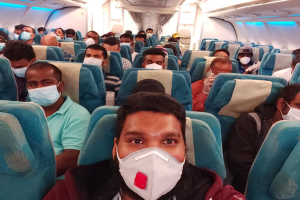Repatriating Migrants during COVID-19: Challenges for the Sri Lankan Government
Chulanee Attanayake
6 June 2020Summary
Soon after Sri Lanka closed its border to control the influx of imported COVID-19 cases, hundreds of thousands of Sri Lankans living or stranded overseas asked their government to bring them back. While the government is responsible for looking after all its citizens, repatriation is a calculated risk in times of a pandemic. In addition straining the healthcare sector, repatriation can adversely impact Sri Lanka’s foreign relations.
Introduction
On 17 March 2020, the Sri Lankan government announced the closure of its international airports for commercial passenger flights arriving into the country. Without a date set for the reopening, Sri Lankans stranded overseas grew extremely anxious about returning home during the pandemic. As a result, the demand and pressure on the Sri Lankan Ministry for Foreign Relations (MFR) from within and outside Sri Lanka grew significantly.
In late March 2020, the ministry established the ‘Contact Sri Lanka’ web portal to gather information on Sri Lankans residing or had travelled overseas so that it could provide the necessary assistance. According to the Secretary to the MFR, Ravinath Ariyasinghe, 42,522 Sri Lankans registered on the portal as at 27 May 2020, waiting to return home. Fortunately, there is a significant Sri Lankan community living across globally which has chosen to remain at its place of domicile.
In spite of their limited resources, the Sri Lankan missions abroad have been addressing the concerns of overseas-based Sri Lankans, who are facing the repercussions of the global pandemic, including loss of employment; being stranded without shelter, food or money; or not having access to affordable healthcare. Thus, repatriation has become the most pressing demand of many Sri Lankans abroad.
Repatriation of Sri Lankans
On 21 April 2020, Sri Lanka began repatriating citizens stranded abroad. As at 28 May 2020, 5,727 Sri Lankans have been repatriated from 21 countries. The repatriation process has given priority according to the maximum vulnerability identified. As such, students and Sri Lankans on pilgrimage and short visits were given a priority during the first phase. The repatriation process proved successful as there were less than 200 COVID-19 positive cases among those who returned during this first phase.
A cabinet paper presented by the Minister of Foreign Relations and Foreign Employment, Dinesh Gunawardena, identified foreign migrant workers in certain countries who were in dire straits and emphasised the need to repatriate them in parallel with any other repatriation process. Following this diktat, migrant workers from the Gulf began to return.
Sri Lankans in the Gulf form a significant portion of the country’s overseas workforce with a majority of them being low-skilled and semi-skilled workers. The spread of the COVID-19 pandemic in the Middle Eastern countries has led to increased cases of unemployment; loss of contracts; non-extension of work permits; and halting of temporary freelance work. As a result, a section of these workers needed urgent assistance to return home. Moreover, the general amnesty declared by some countries such as Kuwait increased anxiety among Sri Lankans for the fear that they would be unable to take advantage of the situation. The amnesty allows workers without valid permits to leave Kuwait and return later to work legally. Considering the situation, the Sri Lankan government sped up the repatriation from the Gulf countries.
Foreign Relations Challenges
Ensuring the protection of every Sri Lankan is the government’s responsibility, whether they are living within the borders or not. However, it is important for the government to also ensure the smooth repatriation so that its relations with the host country are not strained.
Unfortunately, repatriation of Sri Lankans from the Middle East, especially from Kuwait was not a smooth process. Though this was done in collaboration with the Kuwaiti government, the Sri Lanka Embassy in Kuwait had little control over selecting passengers or ensuring their health status before their flight home. Moreover, out of the 466 returnees, 379 had benefitted from the amnesty scheme and had surrendered to the camps between 21 and 25 April 2020. There were another 87 who were from Kuwait detention centres and prisons. The returnees formed the second-largest pandemic cluster in the country.
On 19 May 2020, as the repatriation from the Middle East began, the number of positive cases in Sri Lanka saw a sudden spike. Of the 460 people who returned from Kuwait by 28 May 2020, 388 tested positive for the virus. Housing arrangements in amnesty camps and for convicted migrants, lack of affordable healthcare and lack of polymerase chain reaction testing available for migrant workers could have resulted in the spread of the virus amongst the returning community. As there is still a considerable number of Sri Lankans yet to return from the Middle East and elsewhere, and that the pandemic is not entirely under control in the country, the repatriation could test Sri Lanka’s relations with the countries where these Sri Lankans are based.
Remittances from migrant workers contribute significantly to Sri Lanka’s foreign exchange. Further, migrant labour has alleviated unemployment among the poorer segments in Sri Lanka. As such, any damage in relations with countries which welcome Sri Lanka’s labour force will have long-term repercussions when Sri Lanka is ready to send back its people post-pandemic to these countries.
. . . . .
Dr Chulanee Attanayake is a Visiting Research Fellow at the Institute of South Asian Studies (ISAS), an autonomous research institute at the National University of Singapore (NUS). She can be contacted at chulanee@nus.edu.sg. The author bears full responsibility for the facts cited and opinions expressed in this paper.
-
 More From :
More From :
-
 Tags :
Tags :
-
 Download PDF
Download PDF


